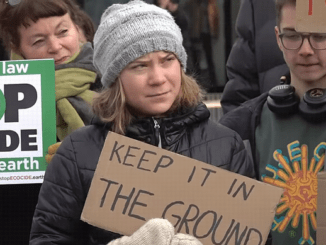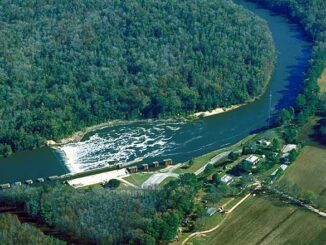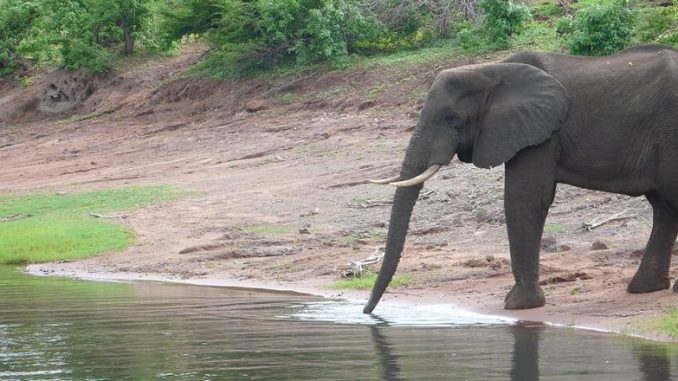
WINDHOEK, Namibia, June 23, 2021 (ENS) – The Canadian oil and gas company Reconnaissance Energy Africa, or ReconAfrica, is currently drilling for oil in Namibia, with further exploration in Botswana moving forward too. Ultimately, the company aims “to develop an area roughly the size of Belgium into an oil field.” according to activists against the exploration.
Environmental activists held a protest in Windhoek in late February, demanding a moratorium on the ReconAfrica oil drilling project in the Okavango Delta until proper procedures have been followed and assessment is conducted by all responsible ministries.
One promotional article branded the project potentially “The Most Exciting Oil Play Of The Decade.” ReconAfrica paid the company behind that article $70,000 to “write and disseminate” it, according to a disclaimer. It’s quickly, however, becoming one of the most controversial and contested oil plays too.
ReconAfrica licenses 2.2 million acres in northwestern Botswana and 6.3 million acres in northeastern Namibia, both in the deep Kavango Basin in the Kalahari Desert. This 13,200-square-mile area includes part of the vital watershed of the Okavango Delta, one of the largest inland deltas in the world.
“National Geographic” magazine describes the Okavango Delta, a UNESCO-protected World Heritage site, and its residents. “Its watershed supports more than a million people and bountiful wildlife, from lions, giraffes, and slaty egrets to African wild dogs and the world’s largest remaining population of endangered savanna elephants.”
“National Geographic” has described it as the “last stronghold” for elephants because it’s a sanctuary for the largest remaining herd of endangered African savannah elephants.
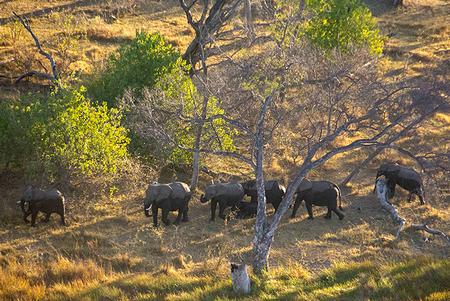
The oil drilling project is happening amid a growing consensus, even within the International Energy Agency, according to a report earlier this month, that no one should be exploring for new sources of fossil fuels. It is, after all, largely fossil fuels that have caused the climate crisis. Plus, the world already has more known reserves of fossil fuels than it can use if we want to avoid absolute environmental catastrophe.
Challenges to ReconAfrica’s plans are coming thick and fast, with protests and actions in multiple countries, including in Namibia, around World Environment Day on June 5. Resistance to the project is not restricted to protests though, it is happening on many fronts.
Unauthorised Use of Land
As the Kavango Alive information hub outlined in a statement, farmer Andreas Sinonge is suing ReconAfrica’s Namibian branch over alleged unauthorised use of his family’s land. The Legal Assistance Centre, LAC, filed the lawsuit at Namibia’s high court on April 19 on Sinonge’s behalf.
As outlined in the affidavit, Sinonge is a member of the Shambyu Traditional Community who resides in Mbambi village in the Kavango East region of Namibia. He claims that he and his family have tenure over an area of communal land that ReconAfrica is already carrying out works on.
ReconAfrica has asserted that the Shambyu Traditional Authority approved its use of the land. In March, the “Namibian Sun” reported on conflict of interest concerns about that authority in relation to ReconAfrica. But Sinonge says he and his family weren’t consulted and they didn’t give permission for use of the land.
Sinonge also claims that the works so far have “razed” a forested area and crop fields. He has brought the case in an attempt to secure the restoration of his family’s tenure rights and the rehabilitation of his forest and crop fields.
Indigiwalk
In February, a group of San leaders embarked on a protest walk stretching over 300 miles to Namibia’s diplomatic mission in Cape Town, South Africa. The San are indigenous peoples of southern Africa and the affected area is part of the homeland of San tribes. The petition they handed in also alleged a lack of consultation.
The petition states, “We note that as the custodians of this land for thousands of years, and the rightful current inhabitants and custodians of this land, we have never been consulted, nor have we given the go-ahead to any entities to prospect for oil and gas in this our lands.”
ReconAfrica has held some public consultations, but critics say they have been limited, involved complicated presentations, and lacked meaningful opportunities for engagement with affected communities.
A ReconAfrica spokesperson told the online news outlet “Mongabay,” however, that consultations have “been a success with a largely positive response.”
Legitimising Occupation
Following the initiation of the High Court case, it emerged that ReconAfrica has applied for land rights in two areas in Kavango East, one of which was Mbambi. Notification of these applications appeared in the Namibian media on May 14, along with a seven-day window during which people could object to the proposed five-year-long occupation of the lands for fossil fuel exploration.
On May 18, the Legal Assistance Center sent a letter to the Kavango East Communal Land Board “to officially file the family’s objections,” according to “The Namibian.” In the letter, the LAC referenced the court case and accused ReconAfrica of seeking to “legitimise its unlawful occupation.”
The LAC letter also argued that in circumstances where there is already a dispute pending in the High Court, the faulty application also constitutes a denial of the legal processes due to our client.
LAC urged the board to “evict the applicant, Recon, from the land.”
“A House of Cards”
Meanwhile, ReconAfrica is the subject of a complaint to the U.S. Securities and Exchange Commission, SEC. According to “National Geographic,” a whistleblower submitted a 44-page long complaint to the SEC on May 5. The complaint alleges that “to drive up its stock price, ReconAfrica has violated securities laws by failing to disclose crucial information about its plans to look for oil and gas deposits in the region.
“National Geographic” noted that the company has sponsored content about the potential of any oil discovery, including a claim that the southern African project “could be worth billions.” The company also produced a statement on April 15 that said its first test well shows “clear evidence of a working conventional petroleum system.”
A petroleum geologist who spoke to “National Geographic” argued that ReconAfrica would need “more information from seismic analysis of the geology and multiple test wells” to make such a “bold claim.”
Currently, the company has not yet completed a seismic survey and has only drilled that one test well, although it has begun work on a second well.
Oil industry expert Stephen MacSearraigh said, “They are aggressively pumping the stock price, but if the resource they’re strongly hinting at isn’t actually there, or isn’t of the magnitude they’re suggesting, this is a house of cards.”
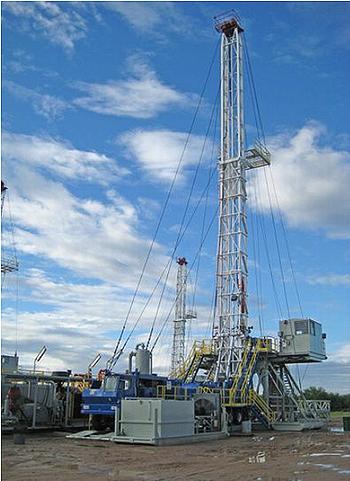
In addition to the anonymous SEC complaint from the whistleblower, the securities class action law firm Schall Law announced on May 24 that it was investigating claims against ReconAfrica “on behalf of investors.” It cited a previous article by “National Geographic” that reported ReconAfrica didn’t appear to have the necessary water-related permits in place, which the outlet said suggested “that the company is operating in breach of Namibian government regulations.”
Calle Schlettwein, Namibia’s minister of agriculture, water, and land reform, the agency responsible for water-related permits, told National Geographic in a written statement in March that ReconAfrica did not yet have permits approved to extract water to use in its drilling operations or to dispose of the wastewater.
In its 2019 environmental assessment, ReconAfrica said it would have all permits in place before work began. The company claims that it “adheres fully to the legal obligations within all territories in which it operates.”
Comments from members of the public informed National Geographic that ReconAfrica was “ignoring local concerns about the impact of exploration and drilling on water supplies, homes, and animals.”
The company’s spokesperson said it has had “detailed consultation with local communities and other stakeholders.”
“Canadian practices and technologies, especially as they pertain to resource exploration and development and ESG practices, are widely regarded as among the best in the world for environmental protection and safety, and we are bringing those innovations to every aspect of our project,” ReconAfrica responded.
“ReconAfrica’s work in Namibia is guided by – and under the constant review and approval of – representatives of a wide range of government Ministries and regulatory agencies including: the Ministry of Mines & Energy (MME), the Ministry of Agriculture, Water & Land Reform (MAWLR), the Ministry of Environment, Forestry & Tourism (MEFT), the Ministry of Home Affairs, Immigration, Safety & Security, and others,” the company said.
However, Namibia’s Minister of Agriculture, Water and Land Reform Schlettwein confirmed on May 26 that his ministry had not yet granted water permits to the company.
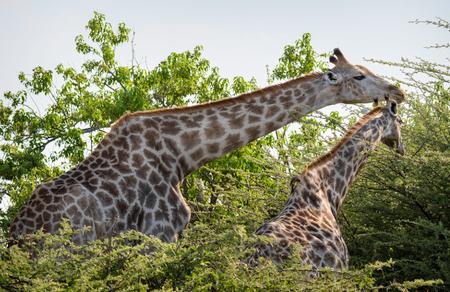
ReconAfrica also pointed to a statement by the Governor of East Kavango Bonifasius Wakudumo, which reads, “We are pleased with ReconAfrica’s approach to working closely and in constant consultation with our office, the traditional leadership, local authority and the community.”
“National Geographic” worries that the water supplies that could be affected by the fossil fuel project include “part of vital watershed of the Okavango Delta.”
Sky News explained in March, “These waters are a lifeblood for tens of thousands of people, countless wild animals, and a huge amount of vegetation. It is a lifeline to a desert delta, and if anything should happen to these waters it will have a catastrophic impact on multiple countries.”
ReconAfrica says its “current operations are more than 50km (30 miles) south of the Okavango River and 260km (160 miles) west of the Okavango Delta.”
Its “current operations” are, however, miniscule in comparison to the scale of operations it hopes to develop if the project goes fully ahead. The company aims to drill hundreds of wells on the 13,200-square-mile area it has leased in Namibia and Botswana.
Furthermore, ReconAfrica’s current operations are close to the Omatako River, which feeds into the Okavango Delta.
“An Arena of Death”
ReconAfrica says it believes the project can happen in a “an environmentally and socially responsible manner” and deliver “much-needed economic and social benefits” to Namibia.
But as the director of Nigeria’s Health of Mother Earth Foundation (HOMEF) Nnimmo Bassey recently wrote, “When the first commercially viable oil well spurted in 1956 in Nigeria’s Niger Delta, there were wild celebrations of progress arriving in the area.”
“After more than six decades of hydrocarbon exploitation in the Niger Delta, the region now ranks as one of the top 10 most polluted places on earth. Water bodies, soils, and the air have all been stoked full of harmful pollutants, and life expectancy now stands at a dreary 41 years.”
Bassey asserted that “exploitation of petroleum resources has routinely been accompanied by extreme ecological harms.” But, in terms of ReconAfrica’s project, he argued that it’s “not too late to pull the plug” on a “gamble” that risks turning the Okavango region “into an arena of death.”
— By Tracey Keeling, edited by Sunny Lewis
Article supported by Conservation Action Trust and originally published in “The Canary.” June 2021. Republished with permission.
[ENS Update: On June 3, ReconAfrica committed to “strengthening its Environment, Social & Governance (“ESG”) standard and committing a minimum of Canadian $10mm (Namibian $112mm) of ESG expenditures to the
Kavango region in which it operates.”
Featured Image: After decades of population declines due to poaching for ivory and loss of habitat, the African forest elephant (Loxodonta cyclotis) is now listed as Critically Endangered and the African savanna elephant (Loxodonta africana) as Endangered on the IUCN Red List of Threatened Species™. Before a March 2021 update, African elephants were treated as a single species, listed as Vulnerable. This is the first time the two species have been assessed separately for the IUCN Red List, following the emergence of new genetic evidence.
© 2021, Environment News Service. All rights reserved. Content may be quoted only with proper attribution and a direct link to the original article. Full reproduction is prohibited.

